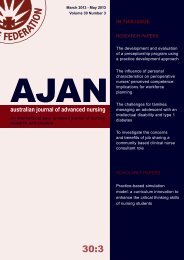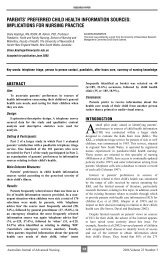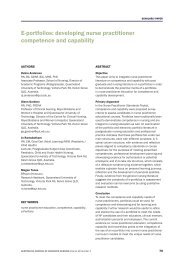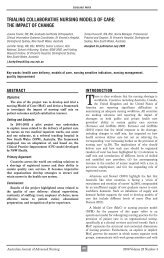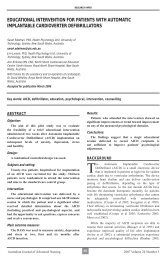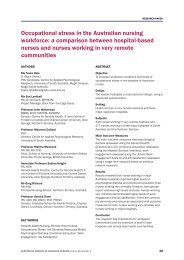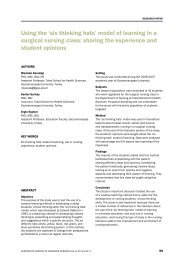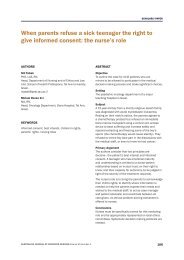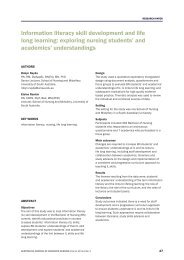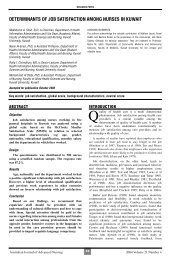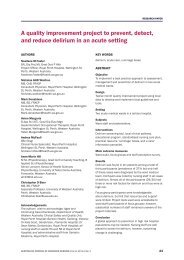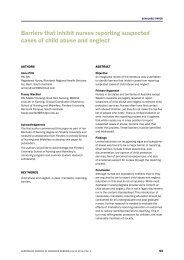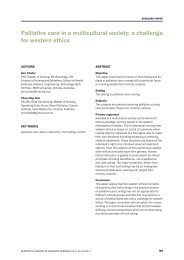australian journal of advanced nursing
australian journal of advanced nursing
australian journal of advanced nursing
You also want an ePaper? Increase the reach of your titles
YUMPU automatically turns print PDFs into web optimized ePapers that Google loves.
commitment and job satisfaction, perceived<br />
organisational support, transformational leadership<br />
behaviour and level <strong>of</strong> education are positive and<br />
significant indicate those who are committed to their<br />
organisations are more satisfied with their job and<br />
their performance is high.<br />
It was very surprising to discover perceived<br />
organisational support was one <strong>of</strong> the most salient<br />
independent variable, considering the different<br />
conclusions stated in the literature. According to<br />
Wynd (2003) nurses received virtually little attention<br />
and no effort was made to make them feel as if they<br />
were important parts <strong>of</strong> the building organisation<br />
(the process by which organisations eventually reach<br />
the ideal <strong>of</strong> learning organisation) and management<br />
team. These feelings led to problems that caused low<br />
morale, lack <strong>of</strong> job satisfaction and the perception<br />
<strong>of</strong> very little or no organisational support. This study<br />
provided contrary results. Most <strong>of</strong> the nurses felt<br />
their employers supported them.<br />
This study also indicated there was a positive<br />
relationship between job satisfaction and<br />
organisational commitment. Job satisfaction has<br />
been mostly concerned with the intrinsic and/or<br />
extrinsic feelings employees had about their job.<br />
Research has provided several findings regarding<br />
the relationship between job satisfaction and<br />
organisational commitment. Bateman and Strasser<br />
(1984) found a causal correlation between the<br />
two variables. Price and Mueller (1986) concluded<br />
the relationship between job satisfaction and<br />
organisational commitment did not exist. Mueller<br />
and Price (1990) determined job satisfaction<br />
was the strongest predictor <strong>of</strong> organisational<br />
commitment and organisational support was the<br />
second strongest. This study however, produced<br />
similar results indicating job satisfaction was the<br />
stronger predictor <strong>of</strong> organisational commitment,<br />
than perceived organisational support.<br />
Transformational leadership behaviour also<br />
influenced organisational commitment in this study<br />
and it is consistent with the earlier research (Pillai<br />
and Wiliams 1998; Bass 1997). Transformational<br />
RESEARCH PAPER<br />
leadership elicits support from members <strong>of</strong> the<br />
organisation through their acceptance <strong>of</strong> the<br />
organisation’s values, goals and behaviours based<br />
on interaction with the transformational leader (Bass<br />
1985). In the past, researchers like Podsak<strong>of</strong>f et<br />
al (1996) Pillai and Wiliams (2004) believed there<br />
was a link between organisational commitment and<br />
transformational leadership behaviour.<br />
Consistent with the idea transformational leadership<br />
behaviour can influence nurses’ organisational<br />
commitment, the results <strong>of</strong> this study helped<br />
clarify the relative importance <strong>of</strong> leadership in<br />
determining how <strong>nursing</strong> staff feel about their jobs.<br />
This is an important finding because leadership<br />
has not been included in most recent studies <strong>of</strong><br />
health care organisational commitment. Therefore,<br />
although job satisfaction has a significant influence<br />
on the satisfaction <strong>of</strong> <strong>nursing</strong> staff, the impact <strong>of</strong><br />
transformational leaders can be significantly greater<br />
in scope.<br />
In addition,education emergedasthethirdsignificant<br />
predictor <strong>of</strong> organisational commitment. Contrary to<br />
the literature, more educated staff members tended<br />
to report higher levels <strong>of</strong> commitment, regardless<br />
<strong>of</strong> their perceptions <strong>of</strong> perceived organisational<br />
support and job satisfaction. This positive relationship<br />
between education and commitment might be due<br />
to the fact staff members who had more education<br />
occupied higher status positions and were more<br />
involved in decision making in the organisation.<br />
Research has shown greater participation in decision<br />
making is strongly associated with higher levels <strong>of</strong><br />
job satisfaction and organisational commitment<br />
(Laschinger et al 2001; Laschinger et al 2000). In<br />
<strong>nursing</strong> homes, staff members who occupy higher<br />
status positions, which provide more opportunities<br />
for involvement in decision making, report higher job<br />
satisfaction and greater commitment than the less<br />
educated parapr<strong>of</strong>essional staff (Sikorska‑Simmons<br />
2005).<br />
LIMITATIONS<br />
The present study has several limitations, some <strong>of</strong><br />
which relate to all leadership research.<br />
AUSTRALIAN JOURNAL OF ADVANCED NURSING Volume 26 Number 4 44



